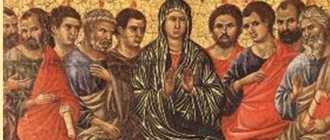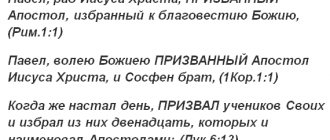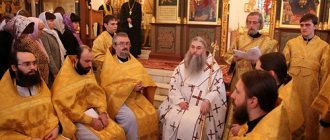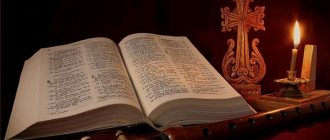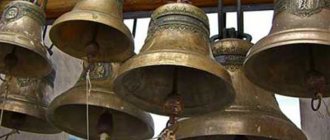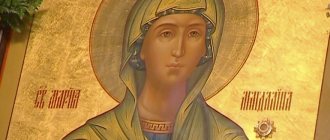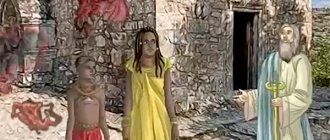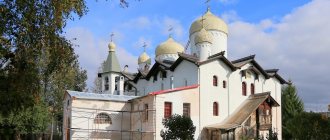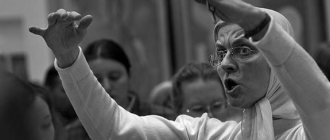Bright Resurrection of Christ. Easter
Acts 1, 1—8
I wrote the first book to you, Theophilus, about everything that Jesus did and taught from the beginning until the day on which He ascended, giving commands by the Holy Spirit to the Apostles whom He chose, to whom He revealed Himself alive, after His passion, with with many true proofs, appearing to them for forty days and speaking about the Kingdom of God. And, having gathered them, He commanded them: do not leave Jerusalem, but wait for what was promised from the Father, which you heard from Me, for John baptized with water, and a few days after this you will be baptized with the Holy Spirit. Therefore, they came together and asked Him, saying: Are you at this time, O Lord, restoring the kingdom to Israel? He said to them: It is not your business to know the times or seasons that the Father has appointed in His authority, but you will receive power when the Holy Spirit comes on you; and you will be my witnesses in Jerusalem and in all Judea and Samaria, and even to the ends of the earth.
In the preface, the author addresses a certain Theophilus and at the same time points to his first book
in which he wrote
about everything that Jesus did and taught from the beginning
.
It is quite obvious that here we are talking about our third canonical Gospel, which was written by Luke for the same venerable Theophilus
.
St. Luke points out the internal organic connection between his Gospel and this second book, which should serve as a continuation of the first. Everything ,
for St.
John even considers it impossible to describe everything (see: John 21:25). Everything
here is said in the sense: “everything necessary” so that you can become acquainted with the life, activity and teaching of the Lord Jesus Christ and believe in Him as the Son of God.
What Jesus Did and Taught from the Beginning
– these words would be more correctly translated in Russian: “what Jesus began to do and what Jesus began to teach.” The writer wanted to express by this that in His earthly life the Lord had just begun to create and teach, and will continue this through the apostles (whose actions will be described in the book he offers) and, of course, through their successors until the end of the century (cf.: Matthew 28:20).
Until the day that He ascended
. – The Ascension of the Lord is indicated here as a turning point: this is the end of the Gospel and the beginning of the Apostolic history. Until this moment, the visible activity of the Lord took place on earth, and from this moment His invisible activity begins.
Giving commands to the apostles by the Holy Spirit
- the importance of this turning point in the history of the salvation of mankind is that the Lord ascended, leaving His Disciples a commandment-testament as an expression of His last will to spread and establish His teaching throughout the world.
Holy Spirit
– The Lord Jesus Christ created everything
with the Holy Spirit
, for, according to the expression of the blessed one.
Theophylact, “where the Son creates, the Spirit cooperates and is co-present, as one in essence.” This testament was not given to everyone, but only to those whom He chose
- He chose for this great work.
To whom He showed Himself alive
- so that the apostles could testify about Him throughout the world, the Lord revealed Himself to them alive after His suffering and death and assured them of the truth of His resurrection, appearing to them for forty days. The Book of Acts, then. complements the Gospel, indicating that although the Lord did not remain with His disciples continuously after His resurrection, He appeared to them many times and only after forty days He ascended from them to heaven. During this period, He taught them the secrets of the Kingdom of God, presumably, the structure of this Kingdom, or the Church of Christ, on earth, in order to prepare them for the apostolic activity ahead of them.
The Lord, having gathered them, commanded them: do not leave Jerusalem.
, which required considerable self-sacrifice from the students, because they, of course, would not want to remain in this city hostile to their Teacher and themselves.
But such was the will of God: for out of Zion will come the law, and the word of the Lord from Jerusalem
(Isa. 2, 3 ff.) - precisely where the enmity against God and His Christ reached its highest expression, the abundance of God’s grace was to appear and the spread of the Gospel throughout the universe will begin.
With this difficult command to remain in a hostile city, the Lord immediately combined the joyful promise of sending down to the apostles an omnipotent Patron and Guide from the Almighty Father - the Holy Spirit. There is no doubt that by what was promised from the Father
we mean the Holy Spirit, Whom God the Father promised to send through the prophets in the Old Testament (see, for example: Isa. 44:3; Joel. 3:1).
What have you heard from Me?
- The Lord spoke about the Holy Spirit to the apostles many times, and especially in His last farewell conversation, calling Him
another Comforter
(cf. Luke 12:12; Matthew 10:20; John 14:16-17 and 26; John 15 , 26; John 16, 7 and 13).
For John baptized with water...
The greatest of the prophets, St., himself spoke about this descent of the Holy Spirit.
John the Baptist, who contrasted his watery, preparatory baptism, with the baptism of the Holy Spirit
(Matt. 3:5; Luke 3:16; John 1:33). The expression “baptized in the Holy Spirit” figuratively indicates the fullness and abundance of the gifts of the Holy Spirit - the apostles, as it were, would be immersed in this all-purifying and life-giving power of the Holy Spirit.
In a few days
– The Lord does not indicate the exact day of the descent of the Holy Spirit, so that the expectation would support in the apostles unceasing spiritual alertness and a joyful desire for the fulfillment of this great promise, thereby kindling their faith. This was fulfilled ten days after the Ascension of the Lord, on the day of the Jewish that year and the first Christian Pentecost.
Is it not at this time, O Lord, that You are restoring the kingdom to Israel?
- this question indicates that the apostles still did not part with the sensual ideas about the Kingdom of the Messiah, common to all Jews.
Only after the descent of the Holy Spirit upon them were they finally reborn spiritually. The Lord’s disciples asked Him this question because they knew the prophet Joel’s prediction about the abundant outpouring of the gifts of the Holy Spirit in the Kingdom of the Messiah
(Joel 2:28).
The Lord wisely eliminates this irrelevant question, saying: it is not your business to know the times or seasons that the Father has appointed in His authority
.
In a few days, when the Holy Spirit descends on them, they will no longer ask such a question: their job is to be witnesses of the Lord, that is, preachers of His Gospel, and for this they will receive the power they need when the Holy Spirit descends on them
.
In Jerusalem and throughout Judea and Samaria and even to the ends of the earth
– Jerusalem, as the city in which the Lord was crucified, should be the first to hear the sermon about the crucified and risen Messiah, then the Word of God should first of all be preached to all the chosen people of God in Judea, then to the Samaritans, as their closest neighbors, and then to the pagans Worldwide.
Averky (Taushev), archbishop. Four Gospels. Apostle. A Guide to Studying the Holy Scriptures of the New Testament. M.: PSTGU Publishing House, 2007.
Easter, Lord's Easter!
The Lord brought us from death to life by His Resurrection. And now this Resurrection “Angels sing in heaven,” having seen the lightness of the deified human nature in the glory predetermined for it, in the face of the Lord the Redeemer, in whose image, by the power of His Resurrection, all those who truly believe in Him and cleave to Him with all their souls were to be transformed. Glory, Lord, to Your glorious Resurrection! The angels sing, rejoicing with us and anticipating the replenishment of their host; Vouchsafe us, Lord, to glorify You, the Risen One, with a pure heart, seeing in Your Resurrection the suppression of the corruption that consumes us, the seeding of a new bright life and the dawn of future eternal glory, into which You entered as the Forerunner by the Resurrection for our sake. Not only human, but also the tongues of angels are not strong enough to express your ineffable mercy towards us, gloriously Risen Lord!
Theophan the Recluse of Vyshensky, St. Thoughts for each day of the year based on church readings from the Word of God. M.: “Father's House”, 2009.
Bright Week
Monday
Acts 1, 12–17, 21–26
Then they returned to Jerusalem from the mountain called Olivet, which is near Jerusalem, a Sabbath's journey away. And when they came, they went up to the upper room, where they stayed, Peter and James, John and Andrew, Philip and Thomas, Bartholomew and Matthew, James Alphaeus and Simon the Zealot, and Judas the brother of James. They all continued with one accord in prayer and supplication, with some of the women and Mary, the Mother of Jesus, and with His brothers. And in those days Peter, standing in the midst of the disciples, said (there was a meeting of about one hundred and twenty people): Men and brethren! It was necessary to fulfill what the Holy Spirit foretold in the Scriptures through the mouth of David about Judas, the former leader of those who took Jesus; he was numbered among us and received the lot of this ministry.
Therefore, it is necessary that one of those who were with us throughout the entire time that the Lord Jesus stayed and spoke with us, starting from the baptism of John until the day on which He ascended from us, should be a witness with us to His resurrection. And they appointed two: Joseph, called Barsaba, who was called Justus, and Matthias; and they prayed and said: You, Lord, knower of the hearts of all, show of these two one whom You have chosen to accept the lot of this ministry and Apostleship, from which Judas fell away in order to go to his place. And they cast lots for them, and the lot fell to Matthias, and he was numbered among the eleven Apostles.
Then they returned
.
When - then
?
When they listened to the words of the Angels. The disciples would not have endured separation from the Lord at all if they had not been promised that He would come another time. And it seems to me that this happened on Saturday: otherwise the writer would not have indicated the distance in this way, he would not have said: from the mountain called Olivet, which is located near Jerusalem, within the distance of the Sabbath journey
, - if not on the Sabbath day they passed a certain distance. this day the space of the path.
And when they arrived, they went up to the upper room, where they stayed
. This means that they remained in Jerusalem after the resurrection.
Peter
, it is said,
and James, John
.
Not only John and his brother are already mentioned, but also Andrew and Peter: Andrew, Philip and Thomas, Bartholomew and Matthew, James Alphaeus and Simon the Zealot, and Judas, brother of James
.
It was not without reason that he mentioned the disciples by name: since one of them became a traitor, another denied, the third did not believe, he shows that, except for one traitor, everyone was safe. All of them unanimously continued in prayer and supplication, with some of their wives
.
Wonderful! Prayer is a powerful weapon among temptations. On the one hand, they had already been sufficiently taught this by the Teacher Himself, and on the other hand, they were also tempted by real temptation: that is why they ascended to the upper room because they were greatly afraid of the Jews. With wives
- says (the writer), because (in the Gospel) he said that they followed Christ.
And Mary, the Mother of Jesus, and with His brothers
.
But how does (John) say that then the disciple took Her to him
(John 19:27)?
After Christ gathered the disciples again, She was again with them. With His brothers
,” he speaks of those who did not believe in Christ before.
And in those days Peter stood in the midst of the disciples and said
.
Peter is always the first to speak, partly because of the liveliness of his character, and partly because Christ entrusted His flock to him and he was the first in the ranks (of the apostles). There was a meeting of about one hundred and twenty people: men and brethren!
What the Holy Spirit had foretold in Scripture had to be fulfilled .
Why didn’t he ask Christ on his own behalf to give him someone instead of Judas? Or why don’t the apostles (all together) make a choice on their own? Peter has now become better than he was before: this is how you can answer the first question. As for why, not simply, but through revelation, they ask to replenish their congregation, I will point out two reasons for this: the first is that they were busy with something else; and the other is that this served as the greatest proof that Christ was with them. Even while he was absent (apparently), He Himself chose just as precisely as when He was with them: and this served as an important consolation for them. But look how Peter does everything with general consent and does not dispose of anything arbitrarily and as a boss. And he didn’t just say: “in Judas’s place we elect so-and-so”; but in order to reassure the disciples regarding what has happened, look at how he begins his speech. This event, indeed, caused them considerable bewilderment; and this is not surprising: if many people talk about it now, then what naturally should have been said to them then? Men
, he says,
brethren
.
If the Lord called them brethren, then all the more fitting was such an appeal to Peter, which is why he exclaims like that in the presence of everyone. This is the dignity of the Church and her angelic state! No one was separated from others then, neither man nor woman. And I would like the Churches to be like this even now. No one then cared about anything in everyday life, no one cared about the house. That's how useful temptations are! What a blessing - adversity! What the Holy Spirit had foretold in Scripture had to be fulfilled
.
Constantly consoles them with prophecy. This is what Christ does in every case. In exactly the same way, Peter shows that there is nothing strange in this event, but that it had already been predicted. It was necessary
, he says,
to fulfill what the Holy Spirit predicted in Scripture through the mouth of David
.
He does not say, “David said,” but, “The Spirit came through him.” <…> See how they assimilate the prophet and display his name, knowing that it will be useful for them that this saying belongs to David, and not to another prophet. About Judas, the former leader
.
Notice here the wisdom of this man: he does not blaspheme or dishonor (Judas), does not say that he was a villain, and the most terrible villain, but simply explains what happened. He doesn’t even call him a traitor, but tries, as much as possible for him, to place the blame on others. However, he doesn’t really blame those either: he was
, he says,
the leader of those who took Jesus
.
And before he indicated the place where this saying of David is located, he recalls the fate that befell Judas, in order through the present to certify in the future and to show that (Judas) has already received punishment. He was numbered among us and received the lot of this ministry;
but he acquired the land with an unrighteous bribe .
Depicts the character (of Judas) and discreetly reveals (his) guilt worthy of punishment. He does not say: “the Jews (acquired)”, but: he acquired the land with an unrighteous bribe
.
And since people with weak souls look not so much at the future as at the present, he talks about the punishment that befell him in this life. And when he fell
.
He did an excellent job, stopping his speech not on the crime of Judas, but on the punishment that befell him. His belly split open and all his entrails fell out
.
This was a consolation for them. And this became known to all the inhabitants of Jerusalem, so that the land in their native dialect was called Akeldama, that is, the land of blood
.
John Chrysostom, St. Conversations on the Acts of the Apostles // John Chrysostom, St. Works in Russian translation in 12 volumes. T. 9, book. 1. SPb.: Publishing house of the St. Petersburg Theological Academy, 1903.
Since the prophecy about the ejection of Judas from the host of the apostles was fulfilled, it is necessary that another prophecy be fulfilled - about filling the empty place: it is necessary to choose another in the place of the traitor and thus fill the number of His twelve apostles established by the Lord. Probably, this replenishment was given by the Lord Himself, which was not written down in the Gospel. The necessary and only condition for the election of a new apostle, St. Peter ordains that the one chosen should be an eyewitness of the entire earthly life and activity of the Lord Jesus Christ. This is because the apostles are first and foremost witnesses
, as the Lord Himself called them (Luke 24:48).
They must testify to the whole world about what they themselves have seen and heard
(Acts 4:20) - this is the special power and persuasiveness of their preaching. On the other hand, constant presence with the Lord during three and a half years of His ministry is a sufficient guarantee of his faith, love and devotion to the Lord: such a person can be entrusted with the performance of apostolic ministry.
From the baptism of John until the day on which He ascended from us
- here the beginning and end of the Lord’s public ministry on earth is indicated, of which the chosen one must be a witness.
Witness of His resurrection
- the second very important condition for election - the main subject of the apostolic witness - is the testimony of the truth of the Resurrection of Christ, the fundamental truth of the saving Christian faith. It is necessary that the chosen apostle be a witness to the reality of the resurrection of the crucified and dead Messiah.
There were two who satisfied these conditions: Joseph, called Barsaba, who was nicknamed Justus, and Matthias. Both are unknown in gospel history. There is an assumption that they were from among the 70 disciples of the Lord. The final election of one apostle from among these two was left to the Lord Himself through lot after fervent prayer that the Lord Himself would show whom He was choosing. Thus, in the election of a new apostle, a double action took place - human and Divine: the apostles with the entire community of believers elect two, the Lord, through their prayer, indicates one.
You, Lord, know the hearts of all...
- this is how they turned to the Lord in prayer: The Lord, the Knower of the Heart, who knows the soul of every person, knew which of the two was more capable of carrying out the service entrusted to him. Determination by lot is an Old Testament institution, and in deciding matters by lot they saw the action of God Himself (see: Lev. 16:8-10; Num. 17:1-9; Num. 34:13; Josh. 14:2; 1 Kings 14:42). Names were usually written on pieces of paper; the sheets were put into the vessel, shaken, and whose lot was taken out of the vessel first, he was considered the chosen one.
And the lot fell to Matthias
- They saw the will of God in this,
and he was numbered among the eleven apostles
. <…> Another candidate Joseph, also known as Justus, was later the bishop of Eleutheropolis in Judea and also ended his life as a martyr. His memory is October 30 (November 12 n.st.).
Averky (Taushev), archbishop. Four Gospels. Apostle. A Guide to Studying the Holy Scriptures of the New Testament. M.: PSTGU Publishing House, 2007.
Tuesday
Index of Gospel and Apostolic readings [of the Orthodox Church] for each day of the year
Christian Education website
[page updated 10/10/21 10:26 ]
Main table * Sunday morning gospels * Apostles and gospels of the permanent feasts * Apostles and gospels common to saints * Apostles and gospels for different occasions *
The year in church time, relative to the reading of the Gospels and the Apostles, begins with the day of the Holy Resurrection of Christ and is divided into three periods. The first period consists of eight weeks (weeks), starting from Easter to Pentecost, or Trinity week (inclusive); the second period contains thirty-six weeks, begins with the first Sunday after Pentecost and continues until Lent; /=> / The third period includes the weeks of Great Lent.
| Week | day | readings at the liturgy | Nos. fragments of the Gospels. th-th by agreement ( / - what constitutes part of the fragment, in this case the same parallel places; ~ - French tk. in one of the Gospels) | * | |||
| apostolic | evangelical | ||||||
| basic themes (apostolic; evangelical; general) | |||||||
| Sun, Easter | Acts 1.1–8 | In. 1.1–17 | |||||
| On the same day at Vespers: John. 20.19–25 | |||||||
| Easter week | Mon | Acts 1.12–17. 21–26 | In. 1.18–28 | (Matthew 3:1-12; Mark 1:1-8; Luke 3:1-18) | |||
| Tue | Acts 2.14–21 | OK. 24.12–35 | 168, 170 (Mark 16:9-13) | ||||
| Wed | Acts 2.22–36 | In. 1.35–51 | -24~~ | ||||
| Thu | Acts 2.38–43 | In. 3.1–15 | /28~ | ||||
| Fri | Acts 3.1–8 | In. 2:12–22 (Jesus comes to the Temple on Easter; expulsion of the heaters and money changers; “Destroy this Temple, and in 3 days I will raise it up”) | 26~, /27~ ( cf. 130: Matthew 21:12-16; Mark 11:15-18; Luke 19:45-48) | ( 418) | |||
| Sat | Acts 3.11–16 | In. 3.22–33 | /29~, 30~ | ||||
| Sun 2, “About Thomas” | at Matins: (1) | Acts 5.12–20 | In. 20.19–31 | 171, 172~, /176a~ (Mark 16:14; Luke 24:36-49) | |||
| 2nd week of Easter | Mon | Acts 3.19–26 | In. 2.1–11 (Marriage at Cana) | 25~ | |||
| Tue | Acts 4.1–10 | In. 3.16–21 | /28~ | ||||
| Wed | Acts 4.13–22 | In. 5.17–24 | /45~ | ||||
| Thu | Acts 4.23–31 | In. 5.24–30 | /45~ | ||||
| Fri | Acts 5.1–11 | In. 5.30 – 6.2 | /45~, /74 | ||||
| Sat | Acts 5.21–33 | In. 6.14–27 | , /77~ | ||||
| Sun 3, “about the Myrrh-Bearers” | at Matins: (3) | Acts 6.1–7 | Mk. 15.43 – 16.8 /69/ | ||||
| 3rd week of Easter | Mon | Acts 6.8 – 7.5, 47-60 | In. 4.46–54 | ||||
| Tue | Acts 8.5–17 | In. 6.27–33 | |||||
| Wed | Acts 8.18–25 | In. 6.35–39 | |||||
| Thu | Acts 8.26–39 | In. 6.40–44 | |||||
| Fri | Acts 8.40 – 9.19 | In. 6.48–54 | |||||
| Sat | Acts 9.20–31 | In. 15.17 – 16.2 /52/ | |||||
| Sun 4, “about the Relaxed One” | at Matins: (4) | Acts 9.32–42 | In. 5.1–15 | ||||
| 4th week of Easter | Mon | Acts 10.1–16 | In. 6.56–69 | ||||
| Tue | Acts 10.21–33 | In. 7.1–13 | 435 | ||||
| Wed (Middle Pentecost) | Acts 14.6–18 | In. 7.14–30 | |||||
| Thu | Acts 10.34–43 | In. 8.12–20 | |||||
| Fri | Acts 10.44 – 11.10 | In. 8.21–30 | |||||
| Sat | Acts 12.1–11 | In. 8.31–42 | |||||
| Sun 5, “about the Samaritan” (Samaritan woman) | at Matins: (7) | Acts 11.19–26. 29–30 | In. 4.5–42 | 440 +Bloom | |||
| 5th week of Easter | Mon | Acts 12.12–17 | In. 8.42–51 | ||||
| Tue | Acts 12.25 – 13.12 | In. 8.51–59 | |||||
| Wed | Acts 13.13–24 | In. 6.5–14 | /74 | 443 | |||
| Thu | Acts 14.20–27 | In. 9.39 – 10.9 | |||||
| Fri | Acts 15.5–34 | In. 10.17–28 /37/ | |||||
| Sat | Acts 15.35–41 | In. 10.27–38 /38/ | |||||
| Sun 6, "About the Blind" | at Matins: (8) | Acts 16.16–34 | In. 9.1–38 /34/ | ||||
| 6th week of Easter | Mon | Acts 17.1–15 | In. 11.47–57 /40/ | ||||
| Tue | Acts 17.19–28 | In. 12.19–36 /42/ | |||||
| Wed | Acts 18.22–28 | In. 12.36–47 /43/ | |||||
| Thu (Ascension of the Lord) | Acts 1.1–12 | OK. 24.36–53 /114/ | |||||
| at Matins: Mark. 16.9–20 | |||||||
| Fri | Acts 19.1–8 | In. 14.1–11 /47/ | |||||
| Sat | Acts 20.7–12 | In. 14.10–21 /48/ | |||||
| Sun 7, “Holy Fathers” | at Matins: (10) | Acts 20.16–18. 28–36 | In. 17.1–13 /56/ | ||||
| 7th week of Easter | Mon | Acts 21.8–14 | In. 14.27 – 15.7 /49/ | ||||
| Tue | Acts 21.26–32 | In. 16.2–13 /53/ | |||||
| Wed | Acts 23.1–11 | In. 16.15–23 /54/ | |||||
| Thu | Acts 25.13–19 | In. 16.23–33 /55/ | |||||
| Fri | Acts 27.1–44 | In. 17.18–26 /57/ | |||||
| Sat | Acts 28.1–31 and for the death: 1 Thess. 4.13–17 | In. 21.15–25 /67/ and for death: John. 5.24–30 | |||||
| Sun 8, Pentecost | at Matins: (9) | Acts 2.1–11 | In. 7.37–52; 8.12 /27/ | ||||
| 1st week after Pentecost | Mon (Holy Spirit) | Eph. 5.9–19 | Mf. 18.10–20 /75/ | 108 462 | |||
| Tue | Rome. 1.1–7. 13–17 | Mf. 4.25; 5.1–13 /10/ | /50 | 109! 436! | |||
| Wed | Rome. 1.18–27 | Mf. 5.20–26 /12/ | /50 | 110! 464! | |||
| Thu | Rome. 1.28 – 2.9 | Mf. 5.27–32 /13/ | /50 | 111 | |||
| Fri | Rome. 2.14–29 | Mf. 5.33–41 /14/ | /50 | ||||
| Sat | Rome. 1.7–12 | Mf. 5.42–48 /15/ | /50 | ||||
| Sun 1, All Saints | at Matins: (1) | Heb. 11.33 – 12.2 /330/ | Mf. 10.32–33, 37–38; 19.27–30 | 114 468 | |||
| 2nd week of Pentecost | Mon | Rome. 2.28 – 3.18 | Mf. 6.31–34; 7.9–11 /19/ | /50 | |||
| Tue | Rome. 4.4–12 | Mf. 7.15–21 /22/ | /50 | ||||
| Wed | Rome. 4.13–25 | Mf. 7.21–23 /23/ | /50 | 117 471 | |||
| Thu | Rome. 5.10–16 | Mf. 8.23–27 /27/ | |||||
| Fri | Rome. 5.17 – 6.2 | Mf. 9.14–17 /31/ | |||||
| Sat | Rome. 3.19–26 | Mf. 7.1–8 /20/ | /50 | ||||
| Sun 2 , "All Saints" | at Matins: (2) | Rome. 2.10–16 | Mf. 4.18–23 /9/ | ||||
| 3rd week after Pentecost | Mon | Rome. 7.1–13 | Mf. 9.36 – 10.8 | /72 | 122 476 | ||
| Tue | Rome. 7.14 – 8.2 | Mf. 10.9–15 | /72 | 123 477 | |||
| Wed | Rome. 8.2–13 | Mf. 10.16–22 | /72 | 124 478 | |||
| Thu | Rome. 8.22–27 | Mf. 10.23–31 | /72 | 125 479 | |||
| Fri | Rome. 9.6–19 | Mf. 10.32–36; 11.1 | /72 | 480! | |||
| Sat | Rome. 3.28 – 4.3 | Mf. 7.24 – 8.4 /24/ | /50, | 127! 481! | |||
| Sun 3 | at Matins: (3) | Rome. 5.1–10 | Mf. 6.22–33 /18/ | /50 | 22-23 | ||
| 24-33 | 128 482 | ||||||
| 4th week after Pentecost | Mon | Rome. 9.18–33 | Mf. 11.2–15 | 129! 483! | |||
| Tue | Rome. 10.11 – 11.2 | Mf. 11.16–20 | |||||
| Wed | Rome. 11.2–12 | Mf. 11.20–26 | |||||
| Thu | Rome. 11.13–24 | Mf. 11.27–30 | |||||
| Fri | Rome. 11.25–36 | Mf. 12.1–8 | 133 487 | ||||
| Sat | Rome. 6.11–17 | Mf. 8.14–23 | 134 | ||||
| Sun 4 | at Matins: (4) | Rome. 6.18–23 | Mf. 8.5–13 | 135 | |||
| 5th week after Pentecost | Mon | Rome. 12.4–5.15–21 | Mf. 12.9–13 | 136 490 | |||
| Tue | Rome. 14.9–18 | Mf. 12.14–16.22–30 | |||||
| Wed | Rome. 15.7–16 | Mf. 12.38–45 | |||||
| Thu | Rome. 15.17–29 | Mf. 12.46 – 13.3 | |||||
| Fri | Rome. 16.1–16 | Mf. 13.4–9 | |||||
| Sat | Rome. 8.14–21 | Mf. 9.9–13 | 141! 495!+ | ||||
| Sun 5 | at Matins: (5) | Rome. 10.1–10 | Mf. 8.28 – 9.1 | 142 496 | |||
| 6th week after Pentecost | Mon | Rome. 16.17–24 | Mf. 13.10–23 | ||||
| Tue | 1 Cor. 1.1–9 | Mf. 13.24–30 | |||||
| Wed | 1 Cor. 2.9 – 3.8 | Mf. 13.31–36 | 145 499 | ||||
| Thu | 1 Cor. 3.18–23 | Mf. 13.36–43 | |||||
| Fri | 1 Cor. 4.5–8 | Mf. 13.44–54 | |||||
| Sat | Rome. 9.1–5 | Mf. 9.18–26 | 148 502 | ||||
| Sun 6 | at Matins: (6) | Rome. 12.6–14 | Mf. 9.1–8 | 149 503! | |||
| 7th week after Pentecost | Mon | 1 Cor. 5.9 – 6.11 | Mf. 13.54–58 | 505 | |||
| Tue | 1 Cor. 6.20 – 7.12 | Mf. 14.1–13 | 151 | ||||
| Wed | 1 Cor. 7.12–24 | Mf. 14.35 – 15.11 | |||||
| Thu | 1 Cor. 7.24–35 | Mf. 15.12–21 | |||||
| Fri | 1 Cor. 7.35 – 8.7 | Mf. 15.29–31 | 154 — | ||||
| Sat | Rome. 12.1–3 | Mf. 10.37 – 11.1 | 155 508 | ||||
| Sun 7 | at Matins: (7) | Rome. 15.1–7 | Mf. 9.27–35 | ||||
| 8th week after Pentecost | Mon | 1 Cor. 9.13–18 | Mf. 16.1–6 | 157 511! | |||
| Tue | 1 Cor. 10.5–12 | Mf. 16.6–12 | 512! | ||||
| Wed | 1 Cor. 10.12–22 | Mf. 16.20–24 | 158! 513 | ||||
| Thu | 1 Cor. 10.28 – 11.7 | Mf. 16.24–28 | /86 ( ) | 160 514 | |||
| Fri | 1 Cor. 11.8–22 | Mf. 17.10–18 | 161 515 | ||||
| Sat | Rome. 13.1–10 | Mf. 12.30–37 | |||||
| Sun 8 | at Matins: (8) | 1 Cor. 1.10–18 | Mf. 14.14–22 | 163 517 | |||
| 9th week after Pentecost | Mon | 1 Cor. 11.31 – 12.6 | Mf. 18.1–11 | 165 518 | |||
| Tue | 1 Cor. 12.12–26 | Mf. 18.18–22; 19.1–2, 13–15 | |||||
| Wed | 1 Cor. 13.4 – 14.5 | Mf. 20.1–16 | 520 | ||||
| Thu | 1 Cor. 14.6–19 | Mf. 20.17–28 | 122-123 ( ) | 167 | |||
| Fri | 1 Cor. 14.26–40 | Mf. 21.12–14, 17–20 | 168 522 | ||||
| Sat | Rome. 14.6–9 | Mf. 15.32–39 | |||||
| Sun 9 | at Matins: (9) | 1 Cor. 3.9–17 | Mf. 14.22–34 | ||||
| 10th week after Pentecost | Mon | 1 Cor. 15.12–19 | Mf. 21.18–22 | 171 172525 | |||
| Tue | 1 Cor. 15.29–38 | Mf. 21.23–27 | (^-) | ||||
| Wed | 1 Cor. 16.4–12 | Mf. 21.28–32 | |||||
| Thu | 2 Cor. 1.1–7 | Mf. 21.43–46 | |||||
| Fri | 2 Cor. 1.12–20 | Mf. 22.23–33 | 175 529! | ||||
| Sat | Rome. 15.30–33 | Mf. 17.24 – 18.4 | |||||
| Sun 10 | at Matins: (10) | 1 Cor. 4.9–16 | Mf. 17.14–23 | 177 531 | |||
| 11th week after Pentecost | Mon | 2 Cor. 2.4–15 | Mf. 23.13–22 | ||||
| Tue | 2 Cor. 2.14 – 3.3 | Mf. 23.23–28 | 179 533 | ||||
| Wed | 2 Cor. 3.4–11 | Mf. 23.29–39 | 180 534 | ||||
| Thu | 2 Cor. 4.1–6 | Mf. 24.13–28 | 181 | ||||
| Fri | 2 Cor. 4.13–18 | Mf. 24.27–33, 42–51 | 182 536 | ||||
| Sat | 1 Cor. 1.3–9 | Mf. 19.3–12 | 183! | ||||
| Sun 11 | at Matins: (11) | 1 Cor. 9.2–12 | Mf. 18.23–35 | ||||
| 12th week after Pentecost | Mon | 2 Cor. 5.10–15 | Mk. 1.9–15 /2/ | ||||
| Tue | 2 Cor. 5.15–21 | Mk. 1.16–22 /3/ | |||||
| Wed | 2 Cor. 6.11–16 | Mk. 1.23–28 /4/ | |||||
| Thu | 2 Cor. 7.1–10 | Mk. 1.29–35 /5/ | |||||
| Fri | 2 Cor. 7.10–16 | Mk. 2.18–22 /9/ | |||||
| Sat | 1 Cor. 1.26–29 | Mf. 20.29–34 | |||||
| Sun 12 | at Matins: (1) | 1 Cor. 15.1–11 | Mf. 19.16–26 | 191! 545! | |||
| 13th week after Pentecost | Mon | 2 Cor. 8.7–15 | Mk. 3.6–12 /11/ | ||||
| Tue | 2 Cor. 8.16 – 9.5 | Mk. 3.13–19 /12/ | |||||
| Wed | 2 Cor. 9.12 – 10.7 | Mk. 3.20–27 /13/ | |||||
| Thu | 2 Cor. 10.7–18 | Mk. 3.28–35 /14/ | |||||
| Fri | 2 Cor. 11.5–21 | Mk. 4.1–9 /15/ | 195 ? | ||||
| Sat | 1 Cor. 2.6–9 | Mf. 22.15–22 | 551 | ||||
| Sun 13 | at Matins: (2) | 1 Cor. 16.13–24 | Mf. 21.33–42 | (—) | |||
| 14th week after Pentecost | Mon | 2 Cor. 12.10–19 | Mk. 4.10–23 /16/ | ||||
| Tue | 2 Cor. 12.20 – 13.2 | Mk. 4.24–34 /17/ | 199 554! | ||||
| Wed | 2 Cor. 13.3–13 | Mk. 4.35–41 /18/ | |||||
| Thu | Gal. 1.1–10, – 2.5 /198/ | Mk. 5.1–20 /19/ | 201 556 | ||||
| Fri | Gal. 2.6–10 /201/ | Mk. 5.22–24, – 6.1 /20/ | 557! | ||||
| Sat | 1 Cor. 4.1–5 | Mf. 23.1–12 | 203 558 | ||||
| Sun 14 | at Matins: (3) | 2 Cor. 1.21 – 2.4 | Mf. 22.1–14 | ||||
| 15th week after Pentecost | Mon | Gal. 2.11–16 /202/ | Mk. 5.24–34 /21/ | 560! | |||
| Tue | Gal. 2.21 – 3.7 /204/ | Mk. 6.1–7 /22/ | |||||
| Wed | Gal. 3.15–22 /207/ | Mk. 6.7–13 /23/ | 562! | ||||
| Thu | Gal. 3.23 – 4.5 /208/ | Mk. 6.30–45 /25/ | |||||
| Fri | Gal. 4.8–21 /210/ | Mk. 6.45–53 /26/ | — 564! | ||||
| Sat | 1 Cor. 4.17 – 5.5 | Mf. 24.1–13 | (—) | ||||
| Sun 15 | at Matins: (4) | 2 Cor. 4.6–15 | Mf. 22.35–46 | 566! | |||
| 16th week after Pentecost | Mon | Gal. 4.28 – 5.10 /211/ | Mk. 6.54 – 7.8 /27/ | (—) | |||
| Tue | Gal. 5.11–21 /212/ | Mk. 7.5–16 /28/ | (—) | ||||
| Wed | Gal. 6.2–10 /214/ | Mk. 7.14–24 /29/ | (—) | ||||
| Thu | Eph. 1.1–9 | Mk. 7.24–30 /30/ | (—) | ||||
| Doxology: spirit. gifts; predestinated to His adoption; through the blood of the Son we have found redemption, forgiveness of sins; “So immeasurable is His kindness that He generously poured out on us in the perfection of mind and wisdom! It was He who made us know His secret purpose, which, according to His will, was originally embodied in Christ.” Jesus and the Syrophoenician woman: “It is not good to take the children’s bread and throw it to the dogs” - “But even the dogs under the table eat the crumbs!” | |||||||
| Fri | Eph. 1.7–17 | Mk. 8.1–10 /32/ | (—) | ||||
| Sat | 1 Cor. 10.23–28 | Mf. 24.34–44 | (—) | ||||
| Sun 16 | at Matins: (5) | 2 Cor. 6.1–10 | Mf. 25.14–30 | 197 | |||
| co-workers/co-workers with God; let “grace” not be in vain; "At a propitious time I heard you, on the day of salvation I helped you"; “now is the day of salvation”; We do not put up obstacles so as not to bring criticism to our service; true servants of God: we patiently and steadfastly endure troubles, needs, misfortunes... our weapon is righteousness; ready for honor and dishonor, for slander and for good fame, we are taken for liars, but we are sincere, for unknown, but everyone knows us, for the dead, but we are alive, we are sad, but we are always happy, we are poor, but We make many rich, we have nothing, but we own everything; our hearts are wide open for you; It is you who close your soul to us. | |||||||
| 17th week after Pentecost | Mon | (the same Gospel readings are scheduled for the corresponding days of the 32nd week) | Eph. 1.22 – 2.3 | Mk. 10.46–52 /48/ | 124 | ||
| Tue | Eph. 2.19 – 3.7 | Mk. 11.11–23 /50/ | 130, /131 | 332 | |||
| Wed | Eph. 3.8–21 | Mk. 11.23–26 /51/ | /131 (23-24: Matthew 21:21-22) | ||||
| Thu | Eph. 4.14–19 | Mk. 11.27–33 /52/ | 132a | (—) | |||
| Fri | Eph. 4.17–25 | Mk. 12.1–12 /53/ => | 132b | (—) | |||
| Sat | 1 Cor. 14.20–25 | Mf. 25.1–13 | (—) | ||||
| Sun 17 | at Matins: (6) | 2 Cor. 6.16 – 7.1 | Mf. 15.21–28 | (—) | |||
| 18th week after Pentecost | Mon | Eph. 4.25–32 /227/ | OK. 3.19–22 /10/ | , | |||
| Tue | Eph. 5.20–26 /230/ | OK. 3.23 – 4.1 /11/ | |||||
| Wed | Eph. 5.25–33 /231/ | OK. 4.1–15 /12/ | , | ||||
| Thu | Eph. 5.33 – 6.9 /232/ | OK. 4.16–22 /13/ | /36~ | ||||
| Fri | Eph. 6.18–24 /234/ | OK. 4.22–30 /14/ | /36~ | ||||
| Sat | 1 Cor. 15.39–45 /162/ | OK. 4.31–36 /15/ | |||||
| Sun 18 | at Matins: (7) | 2 Cor. 9.6–11 /188/ | OK. 5.1–11 /17/ | ||||
| Jesus teaches from Simon's boat. Wonderful fishing: “If You command, I will cast the nets.” “Get away from me, Lord, I am a sinful man!” “From now on you will be a fisher of men.” They left everything and followed Him. | |||||||
| 19th week after Pentecost | Mon | Phil. 1.1–7 /235/ | OK. 4.37–44 /16/ | 39-41 | 212 | ||
| Tue | Phil. 1.8–14 /236/ | OK. 5.12–16 /18/ | 213 575 | ||||
| Wed | Phil. 1.12–20 /237/ | OK. 5.33–39 /21/ | |||||
| Thu | Phil. 1.20–27 /238/ | OK. 6.12–19 /23/ | , | ||||
| Fri | Phil. 1.27 – 2.4 /239/ | OK. 6.17–23 /24/ | , /50 ( 17-19: Matthew 4:23-25 | 20-23: Matthew 5:3-11) | ||||
| Sat | 1 Cor. 15.58 – 16.3 /164/ | OK. 5.17–26 /19/ | 217 579 | ||||
| Sun 19 | at Matins: (8) | 2 Cor. 11.31 – 12.9 /194/ | OK. 6.31–36 /26/ | /50 (Matt.5:46-48) | |||
| 20th week after Pentecost | Mon | Phil. 2.12–16 /241/ | OK. 6.24–30 /25/ | /50 (Matt.5:38-42) | |||
| Tue | Phil. 2.17–23 /242/ | OK. 6.37–45 /27/ | /50 ( 37-38,41-42: Matthew 7:1-5 | 40: Matthew 10:24-25 | 43-45: Matthew 7:16-20; 12:33-35 , etc. ) | ||||
| Wed | Phil. 2.24–30 /243/ | OK. 6.46 – 7.1 /28/ | /50 (47-49: Matthew 7:24-27) | 221 583! | |||
| Thu | Phil. 3.1–8 /244/ | OK. 7.17–30 /31/ | /54 ( 18-28: Matthew 11:2-11 | 29-30: Matthew 21:32; Luke 3:12) | ||||
| Fri | Phil. 3.8–19 /245/ | OK. 7.31–35 /32/ | /54 (Matthew 11:16-19) | ||||
| Sat | 2 Cor. 1.8–11 /168/ | OK. 5.27–32 /20/ | 224! 586!+ | ||||
| Sun 20 | at Matins: (9) | Gal. 1.11–19 /200/ | OK. 7.11–16 /30/ | 53~ | |||
| 21st week after Pentecost | Mon | Phil. 4.10–23 /248/ | OK. 7.36–50 /33/ | 55~ | |||
| Tue | Col. 1.1–2.7–11 /249/ | OK. 8.1–3 /34/ | |||||
| Wed | Col. 1.18–23 /251/ | OK. 8.22–25 /37/ | |||||
| Thu | Col. 1.24–29 /252/ | OK. 9.7–11 /41/ | , /74 (10-11: Matthew 14:13-14; Mark 6:30) | ||||
| Fri | Col. 2.1–7 /253/ | OK. 9.12–18 /42/ | /74 (Matthew 14:14-21; Mark 6:30-44; John 6:5-13) | 230 592 | |||
| Sat | 2 Cor. 3.12–18 /174/ | OK. 6.1–10 /22/ | 46-47 | 231 593 | |||
| Sun 21 | at Matins: (10) | Gal. 2.16–20 /203/ | OK. 8.5–15 /35/ | /63 (Matthew 13:3-13,18-23; Mark 4:2-20) | |||
| 22nd week of Pentecost | Mon | Col. 2.13–20 /255/ | OK. 9.18–22 /43/ | 233 595 | |||
| Tue | Col. 2.20 – 3.3 /256/ | OK. 9.23–27 /44/ | ( ) | 234 596 | |||
| Wed | Col. 3.17 – 4.1 /259/ | OK. 9.44–50 /47/ | /91 ( Mk.9:31-40 ; Matt.17:22-23; 18:1-5) | ||||
| Thu | Col. 4.2–9 /260/ | OK. 9.49–56 /48/ | /91 (Mark 9:38-40), | ||||
| Fri | Col. 4.10–18 /261/ | OK. 10.1–15 /50/ | |||||
| Sat | 2 Cor. 5.1–10 /178/ | OK. 7.2–10 /29/ | |||||
| Sun 22 | at Matins: (11) | Gal. 6.11–18 /215/ | OK. 16.19–31 /83/ | /110~ | |||
| 23rd week after Pentecost | Mon | 1 Thess. 1.1–5 /262/ | OK. 10.22–24 /52/ | /97 ( 22 : John 3:34; 10:15 | 23-24: Matthew 13:16-17) | |||
| Tue | 1 Thess. 1.6–10 /263/ | OK. 11.1–10 /55/ | /100~ | ||||
| Wed | 1 Thess. 2.1–8 /264/ | OK. 11.9–13 /56/ | /100~ | ||||
| Thu | 1 Thess. 2.9–14 /265/ | OK. 11.14–23 /57/ | |||||
| Fri | 1 Thess. 2.14–19 /266/ | OK. 11.23–26 /58/ | /58 (Matthew 12:30, 43-45) | ||||
| Sat | 2 Cor. 8.1–5 185/ | OK. 8.16–21 /36/ | /63, /59 ( 16-18: Mark 4:21-25 | 19-21: Matthew 12:46-50; Mark 3:31-35) | ||||
| Sun 23 | at Matins: (1) | Eph. 2.4–10 /220/ | OK. 8.26–39 /38/ | 246 608 | |||
| 24th week after Pentecost | Mon | 1 Thess. 2.20 – 3.8 /267/ | OK. 11.29–33 /59/ | /58 (29-32: Matthew 12:39-42) | 247 609 | ||
| Tue | 1 Thess. 3.9–13 /268/ | OK. 11.34–41 /60/ | /58, /60~ ( 34-36: Matt.6:22-23 | 39-40: Matt.23:25-26) | 248 610 | |||
| Wed | 1 Thess. 4.1–12 /269/ | OK. 11.42–46 /61/ | /60~ (Matt.23:23, 6-7, 27-28, 4)+ | 249 611 | |||
| Thu | 1 Thess. 5.1–8 /271/ | OK. 11.47 – 12.1 /62/ | /60~ (Matt.23:29-32, 34-36, 13) | 250 612 | |||
| Fri | 1 Thess. 5.9–13. 24–28 /272/ | OK. 12.2–12 /63/ | /61~ ( 2-9: Matthew 10:26-33 | 11-12: Matthew 10:19-20) | 251 613! | |||
| Sat | 2 Cor. 11.1–6 /191/ | OK. 9.1–6 /40/ | 252 614 | ||||
| Sun 24 | at Matins: (2) | Eph. 2.14–22 /221/ | OK. 8.41–56 /39/ | 253 615 | |||
| 25th week after Pentecost | Mon | 2 Thess. 1.1–10 /274-/ | OK. 12.13–15. 22–31 /65/ | /61~ (22-31: Matthew 6:25-34) | 254! 616 | ||
| Tue | 2 Thess. 1.10 – 2.2 /275/ | OK. 12.42–48 /68/ | /61~ (Matt.24:45-51) | 255 617 | |||
| Wed | 2 Thess. 2.1–12 /276/ | OK. 12.48–59 /69/ | /61~ ( 51-53: Matt.10:34-36 | 54-56: Matt.16:2-3 | 57-59: Matt.5:25-26 ) | 256 618 | |||
| Thu | 2 Thess. 2.13 – 3.5 /277/ | OK. 13.1–9 /70/ | 62~, 103~ (-) | 619! | |||
| Fri | 2 Thess. 3.6–18 /278/ | OK. 13.31–35 /73/ | /105~ (34-35: Matthew 23:37-39) | 258 | |||
| Sat | Gal. 1.3–10 /199/ | OK. 9.37–43 /46/ | 259! 621! | ||||
| Sun 25 | at Matins: (3) | Eph. 4.1–6 /224/ | OK. 10.25–37 /53/ | 98~ | |||
| 26th week after Pentecost | Mon | 1 Tim. 1.1–7 /278/ | OK. 14.12–15 /75/ | /106~ (-) | |||
| Tue | 1 Tim. 1.8–14 /279/ | OK. 14.25–35 /77/ | 107~ ( 26-27: Matthew 10:37-38; (Matthew 16:24; Mark 8:34; Luke 9:23); 34-35: Matthew 5:13; Mark 9:50 ) | ||||
| Wed | 1 Tim. 1.18–20; 2.8–15 /281/ | OK. 15.1–10 /78/ | /108~ ( 1-2: Matthew 9:10-11; Luke 5:29-30 | 4-7: Matthew 18:12-14) | ||||
| Thu | 1 Tim. 3.1–13 /283/ | OK. 16.1–9 /80/ | /109~ (-) | ||||
| Fri | 1 Tim. 4.4 – 8.16 /285/ | OK. 16.15–18; 17.1–4 /82/ | /110~, /111~ ( 16: Matthew 11:12-13 | 17: Matthew 5:18 | 18: Matthew 5:32; 19:9; Mark 10:11-12; 1 Cor.7: 10-11 | 1-2: Matthew 18:6-7 ; Mark 9:42 ; 3-4: Matthew 18:15,21-22 ) | 265 * | |||
| Sat | Gal. 3.8–12 /205/ {3:11 = Rom.1:17} Conv. from Sat. before Birthday together with Abraham, who believed God, all who believe will receive a blessing; whoever trusts in the works of the Law is under a curse | OK. 9.57–62 /49/ | |||||
| Sun 26 | at Matins: (4) | Eph. 5.9–19 /229/ | OK. 12.16–21 /66/ | /61~ (-) | |||
| 27th week after Pentecost | Mon | 1 Tim. 5.1–10 /285-/ | OK. 17.20–25 /86/ | /113~ (23-24: Matthew 24:26-27) | |||
| Tue | 1 Tim. 5.11–21 /286/ | OK. 17.26–37 /87/ | /113~ ( 26-27: Matthew 24:36-39 | 31: Matthew 24:17-18; Mark 13:15-16 | 33: Matthew 10:39; 16:25; Mark 8: 35; Luke 9:24; John 12:25 | 34-35: Matthew 24:40-41) | 269 — | |||
| Wed | 1 Tim. 5.22 – 6.11 /287/ | OK. 18.15–17. 26–30 /90/ | 119, /120 | ||||
| Thu | 1 Tim. 6.17–21 /289/ | OK. 18.31–34 /92/ | 122 ( ) | 271 632 | |||
| Fri | 2 Tim. 1.1–2.8–18 /290/ | OK. 19.12–28 /95/ | 126~ (Matthew 25:14-30) | — 634 | |||
| Sat | Gal. 5.22 – 6.2 /213/ | OK. 10.19–21 /51/ | /97 | ||||
| Sun 27 | at Matins: (5) | Eph. 6.10–17 /233/ the same in Sat. according to Epiphany "Put on the whole armor of God " | OK. 13.10–17 /71/ | 104~ | |||
| 28th week after Pentecost | Mon | 2 Tim. 2.20–26 /294/ | OK. 19.37–44 /97/ | /129 (-) | |||
| Tue | 2 Tim. 3.16 – 4.4 /297/ | OK. 19.45–48 /98/ | /130 | 276 638 | |||
| Wed | 2 Tim. 4.9–22 /299/ | OK. 20.1–8 /99/ | /132 (Matthew 21:23–27; Mark 11:27-33) | 277 639 | |||
| Thu | Titus 1.5 – 2.1 /300/ | OK. 20.9–18 /100/ | /132 (Matthew 21:33–43; Mark 12:1-11) | 278 640 | |||
| Fri | Titus 1.15 – 2.10 /301/ | OK. 20.19–26 /101/ | /133 (Matthew 22:15-22; Mark 12:12-17) | ||||
| Sat | Eph. 1.16–23 /218/ | OK. 12.32–40 /67/ | /61 | ||||
| Sun 28 | at Matins: (6) | Col. 1.12–18 /250/ | OK. 14.16–24 /91/X | /106~ (Matt.22:1-14) | |||
| 29th week after Pentecost | Mon | Heb. 3.5–11 .17–19 /308/ | OK. 20.27–44 /102/ | /133 (Matthew 22:23-33,41-46; Mark 12:18-27,35-37) | 282 644 | ||
| Tue | Heb. 4.1–13 /310/ | OK. 21.12–19 /106/ | /137 (Matthew 10:17-22; Luke 12:11-12) | 283 645 | |||
| Wed | Heb. 5.11 – 6.8 /312/ | OK. 21, 5–7. 10–11. 20–24 /104/ | /137 (Matthew 24:1-3, 6-8, 15-21; Mark 13:1-4, 7-8, 14-19) | 284 646 | |||
| Thu | Heb. 7.1–6 /315/ | OK. 21.28–33 /107/ | /138 | 647 | |||
| Fri | Heb. 7.18–25 /317/ | OK. 21.37 – 22.8 /108/ | /130, 139, /140 | ||||
| Sat | Eph. 2.11–13 /220/ | OK. 13.18–29 /72/ | /63, /105~ ( 18-21: Matthew 13:31-33; Mark 4:30-32; 23-24: Matthew 7:13-14 (?); 25-27: Matthew 7: 21-23; 25:11-12; 28-29: Matthew 8:11-12) | ||||
| Sun 29 | at Matins: (7) | Col. 3.4–11 /257/X | OK. 17.12–19 /85/ | 112~ | |||
| 30th week after Pentecost | Mon | Heb. 8.7–13 /319/ | Mk. 8.11–21 /33/ | 82-83 | |||
| Tue | Heb. 9.8–10. 15–23 /321/ | Mk. 8.22–26 /34/ | |||||
| Wed | Heb. 10.1–18 /323/ | Mk. 8.30–34 /36/ | |||||
| Thu | Heb. 10.35 – 11.7 /326/ | Mk. 9.10–16 /39/ | /87, /88 | ||||
| Fri | Heb. 11,8,11–16 /327/ | Mk. 9.33–41 /41/ | /91 | ||||
| Sat | Eph. 5.1–8 /228/ imitation of God, sacrifice of Christ, sin, children of light | OK. 14.1–11 /74/ claim. on Sat, the exalted will be humbled... | /106~ | ||||
| Sun 30 | at Matins: (8) | Col. 3.12–16 /258/ | OK. 18.18–27 /76/ | /120 | |||
| 31st week after Pentecost | Mon | Heb. 11.17–23. 27–31 /229/ | Mk. 9.42 – 10.1 /42/ | 296 | |||
| Tue | Heb. 12.25–26; 13.22–25 /333/ | Mk. 10.2–12 /43/ | 297! | ||||
| Wed | James 1:1–18 /50/ | Mk. 10.11–16 /44/ | |||||
| Thu | James 1:19–27 /51/ | Mk. 10.17–27 /45/ | 299! | ||||
| Fri | James 2:1–13 /52/ | Mk. 10.23–32 /46/ | 300! | ||||
| Sat | Col. 1.3–6 /249-/ | OK. 16.10–15 /81/ | /109~, /110~ | 329 | |||
| Sun 31 | at Matins: (9) | 1 Tim. 1.15–17 /*/ | OK. 18.35–43 /93/ | 124 | |||
| 32nd week of Pentecost | Mon | James 2:14–26 /53/ | Mk. 10.46–52 /48/ | ( The Gospel readings of these days coincide with the readings of the corresponding days of the 17th week!) | |||
| Tue | James 3:1–10 /54/ | Mk. 11.11–23 /50/ | |||||
| Wed | James 3:11–4:6 /55/ | Mk. 11.23–26 /51/ | |||||
| Thu | James 4.7–5.9 /56/ | Mk. 11.27–33 /52/ | 334 | ||||
| Fri | 1 Pet.1,1–2,10–12; 2.6–10 /58/ | Mk. 12.1–12 /53/ | |||||
| Sat | 1 Thess. 5.14–23 /273/ | OK. 17.3–10 /84/ | /111~ | ||||
| Sun 32 , "about Zacchaeus" | at Matins: (10) | 1 Tim. 4.9–15 /285-/ | OK. 19.1–10 /94/ | 125~ | |||
| 33rd week of Pentecost | Mon | 1 Pet.2.21–3.9 /59/ | Mk. 12.13–17 /54/ | 310 338 | |||
| Christ, having resignedly (without answering) accepted suffering, gave us an example; He “committed himself into the hands of a righteous Judge”; His sufferings are to deliver us from sins, “By His stripes you are healed”; “You once wandered like sheep, but now you have returned to your Shepherd and Trustee”; wives, obey your husbands, strive for inner beauty; Sarah's example; husbands...; a call to unanimity, love, modesty; respond to evil with blessing Question about taxes; “To Caesar the things that are Caesar’s, to God the things that are God’s,” the Christian is called to peace | |||||||
| Tue | 1 Pet.3:10–22 /60/ | Mk. 12.18–27 /55/ | 133b | 339 | |||
| Do not repay evil for evil; you are called to bless; “Who will harm you if you are zealous for good? But even if you suffer for your righteousness, you are blessed! “Be always ready to give an answer on what your hope is based,” but only meekly; “Keep your conscience clear, so that those who blaspheme your good life will be ashamed of their words”; “It is better to suffer, if it is God’s will, for doing good, and not for doing evil!”; The Sadducees question about women, cat. there were 5 husbands; “You are mistaken because you know neither the Scriptures nor the power of God!”; “God is not the God of the dead, but of the living”; hope - coming resurrection - the power of God ; | |||||||
| Wed | 1Pet.4,1–11 /62/ | Mk. 12.28–37 /56/ | (-) | ||||
| example of Christ; “He was killed physically, but was brought back to life by the Spirit. In the Spirit He went to preach to the spirits in prison” - those who were disobedient to God under Noah; Christ is at the right hand of God, everything is subject to Him; in the past you lived like pagans - that's enough! the coming Judge; “the end of everything is near”; “be wise and watch in prayer”; “have fervent love for one another, because love covers a multitude of sins”; “use wisely this variety of God’s gifts to serve one another”; serve to glorify God. the question of the first commandment; “You are not far from the Kingdom”; “no one dared to ask Him questions anymore”; Jesus question: “How can the scribes say that Christ is a descendant of David?” “have love ,” “love covers...” - the first commandment" (^resurrection - prop. Jesus "dead"; the end of this world - ^resurrection; ^God's power - God's glory) | |||||||
| Thu | 1 Pet. 4.12 – 5.5 /63/ | Mk. 12.38–44 /57/ | 313 341 675! | ||||
| Do not consider the trials strange... rejoice that you are participating in the sufferings of Christ! Judgment is near, it will begin with the house of God; “those who suffer according to God’s will, let them trust the Creator”; instructions to elders: take care of the flock as God does, without seeking profit, be an example; young people, obey your elders; All of you, as you serve one another, clothe yourself with humility, for “God resists the proud, but gives grace to the humble.” Beware of the scribes; their hypocrisy; “they devour the property of widows”; 2 mites for the poor widow Scribes - Christ. shepherds; “beware of the scribes” – but “submit to your elders” | |||||||
| Fri | 2 Pet. 1.1–10 /64/ | Mk. 13.1–8 /58/ | 342 | ||||
| Sat | 2 Tim. 2.11–19 /293/ | OK. 18.2–8 /88/ | 114~ | ||||
| Sun "about the Publican and the Pharisee" /morning/ | 2 Tim. 3.10–15 /296/ | OK. 18.10–14 /89/ | 115~ | ||||
| 34th week after Pentecost (1st preparatory week) | Mon | 2 Pet. 1.20 – 2.9 /66/ | Mk. 13.9–13 /59/ | /137 (Matthew 24:9-14*>; Luke 21:12-19) | 345! 692 | ||
| “No prophecy can be interpreted by man himself, for there has never been a prophecy by the will of man,” inspiration ; “just as there were false prophets in Israel, and there will be false teachers ”; has rewarded in the past (angels, flood, Sodom)...,” The Lord knows how to save the pious from trials , and save the unrighteous for punishment on the Day of Judgment “Be prepared: you will be judged and beaten, you will appear before the rulers because of Me ", persecution , "to testify about Me"; “ before the end comes, all nations must hear the Good News ”; “When you are led to judgment, do not worry about what to say : whatever will be given to you at that hour, then speak - it will not be you who will speak, but the Holy Spirit”; “brother will put brother to death...”, “Because of Me, everyone will hate you. But whoever endures to the end will be saved “ Unjust human judgment - and the Judgment of God; God's help (through the Holy Spirit) and salvation (earthly and eternal) | |||||||
| Tue | 2 Pet. 2.9–22 /67/ | Mk. 13.14–23 /60/ | /137 (Matthew 24:15-25*>; Luke 21:20-24) | 346! 693! | |||
| Wed | 2 Pet. 3.1–18 /68/ | Mk. 13.24–31 /61/ | /137, /138 (Matt.24:29-35*>; Luke 21:25-33*>) | 347 694! | |||
| Thu | 1John 1.8 – 2.6 /69/ | Mk. 13.31 – 14.2 /62/ | /138, 139a (Matt.24:35-36,42; 25:13-15; 26:1-5; Luke 21:33; 12:36-40; 22:1-2; John 11:47 -53) | 348 695 | |||
| Fri | 1John 2.7–17 /70/ | Mk. 14.3–9 /63/ | 128 (Matthew 26:6-13; John 12:1-8) | 349 696 | |||
| Sat | 2 Tim. 3.1–9 /295/ | OK. 20.45 – 21.4 /103/ | 134-135 | ||||
| Sun "about the Prodigal Son" /morning/ | 1 Cor. 6.12–20 /135/ | OK. 15.11–32 /79/ | /108 | 351- | |||
| 35th week after Pentecost (2nd preparatory week) | Mon | 1John 2.18 – 3.10 /71/ | Mk. 11.1–11 /49/ | 699 | |||
| Tue | 1John 3.11–20 /72/ | Mk. 14.10–42 /64/ | /139, 140, 143-144, 147-148 | 353! 700 | |||
| Wed | 1John 3.21 – 4.6 /73/ | Mk. 14.43 – 15.1 /65/ | |||||
| Thu | 1John 4.20 – 5.21 /74/ | Mk. 15.1–15 /66/ | |||||
| Fri | 2Jn. 1.1–13 /75/ | Mk. 15.22–25. 33–41 /68/ | |||||
| Sat | 1 Cor. 10.23–28 and for the repose : 1 Thess. 4.13–17 | OK. 21.8–9. 25–27. 33–36 and for repose: John. 5.24–30 | /137, /138 | ||||
| Sun, Meat Week (“about the Last Judgment”) /morning/ | 1 Cor. 8.8 – 9.2 | Mf. 25.31–46 | |||||
| Cheese week (36) (3rd preparatory week) There is no liturgy on Wednesday and Friday | Mon | 3Jn. 1.1–15 | OK. 19.29–40; 22.7–39 | /129, 140-144, 145~ | 359 706 | ||
| Tue | Jude 1.1–10 | OK. 22.39–42. – 23.1 | /148 ,149, 151-153 | ||||
| Wed | |||||||
| Thu | Jude 1.11–25 | OK. 23.1–34. 44–56 | 154, 155~, 156, 160-161, 163-165 | ||||
| Fri | |||||||
| Sat | Rome. 14:19–26 and Fathers: Gal. 5.22 – 6.2 /213/ | Mf. 6.1–13 /16/ and Fathers: Matt. 11.27–30 | /50 () | ||||
| APOSTLES AND GOSPEL OF SATURDAYS AND SUNDAYS OF GREAT LENT as well as Old Testament readings at Vespers and the 6th hour | |||||||
| Sun, “Cheese Week” (“Forgiveness Sunday”) /morning/ | Rome. 13.11 – 14.4 | Mf. 6.14–21 /17/ | /50 | 365 | |||
| 1st week of Lent | Mon | (at Vespers: Gen.1:1-20; Prov.1:1-20) | 366 | ||||
| Tue | (at Vespers: Gen.1:14-23; Prov.1:20-33) | 367 | |||||
| Wed | (at Vespers: Gen.1:24-2:3; Prov.2:1-22) | 368 | |||||
| Thu | (at Vespers: Gen.2:4-19; Prov.3:1-18) | 369 | |||||
| Fri | (at Vespers: Gen. 2:20-3:20; Proverbs 3:19-34) | 370 | |||||
| Sat 1 | Heb. 1.1–12 /303/ and to the saint: 2 Tim. 2.1–10 | Mk. 2.23 – 3.5 /10/ and to the saint: John. 15.17 – 16.2 /52/ | -47 (Matt.12:1-13*> >; Luke 6:1-10*>) | 371 | |||
| Sun 1 (“Triumph of Orthodoxy”) /morning/ | Heb. 11.24–26. – 12.2 /329-/ | In. 1.43–51 | 372 | ||||
| 2nd week of Lent | Mon | (at the 6th hour: Is.4:2-5:7; at Vespers: Gen.3:21-4:7; Prov.3:34-4:22) | 373 | ||||
| Tue | (at the 6th hour: Is.5:7-16; at Vespers: Gen.4:8-15; Prov.5:1-15) | 374 | |||||
| Wed | (at the 6th hour: Is.5:16-25; at Vespers: Gen.4:16-26; Prov.5:15-6:3) | 375 | |||||
| Thu | (at the 6th hour: Is.6:1-12; at Vespers: Gen.5:1-24; Prov.6:3-20) | 376 | |||||
| Fri | (at the 6th hour: Is.8:1-14; at Vespers: Gen.5:30-6:8; Prov.5:20-7:1) | 377 | |||||
| Sat 2 | Heb. 3.12–16 /309/ and for the repose: 1 Thess. 4.13–17 | Mk. 1.35–44 /6/ and for the repose: John. 5.24–30 | — 42 ( ) | 378 | |||
| Sun 2 (memorial of St. Gregory Palamas) /morning/ | Heb. 1.10 – 2.3 /304/ and to the saint : Heb. 7.26 – 8.2 /318/ | Mk. 2.1–12 /7/ and to the saint : John. 10.9–16 | ( ) | 379 | |||
| 3rd week of Lent | Mon | (at the 6th hour: Is.8:13-9:7; at Vespers: Gen.6:9-22; Prov.8:1-21) | |||||
| Tue | (at the 6th hour: Is.9:9-10:4; at Vespers: Gen.7:1-5; Prov.8:32-9:11) | ||||||
| Wed | (at the 6th hour: Is.10:12-20; at Vespers: Gen.7:6-9; Prov.9:12-18) | ||||||
| Thu | (at the 6th hour: Isa.11:10-12:2; at Vespers: Gen.7:11-8:3; Prov.10:1-22) | ||||||
| Fri | (at the 6th hour: Is.13:2-13; at Vespers: Gen.8:4-21; Prov.10:31-11:12) | ||||||
| Sat 3 | Heb. 10.32–38 /325/ and for the repose : 1 Thess. 4.13–17 | Mk. 2.14–17 /8/ and for the repose: John. 5.24–30 | |||||
| Sun 3 /morning/ | Heb. 4.14 – 5.6 /311/ | Mk. 8.34 – 9.1 /37/ | /86 ( ) | 386! | |||
| 4th week of Lent | Mon | (at the 6th hour: Is.14:24-32; at Vespers: Gen.8:21-9:7; Prov.11:19-12:6) | |||||
| Tue | (at the 6th hour: Is.25:1-9; at Vespers: Gen.9:8-17; Prov.12:8-22) | ||||||
| Wed | (at the 6th hour: Is.26:21-27:9; at Vespers: Gen.9:19-10:1; Prov.12:23-13:9) | ||||||
| Thu | (at the 6th hour: Is.28:14-22; at Vespers: Gen.10:32-11:9; Prov.13:20-14:6) | ||||||
| Fri | (at the 6th hour: Is.29:13-23; at Vespers: Gen.12:1-7; Prov.14:15-26) | ||||||
| Sat 4 | Heb. 6:9–12 /313/ and for the repose: 1 Cor. 15:47–57 | Mk. 7.31–37 /31/ and for the repose: John. 5.24–30 | ( ) | 37a 392 | |||
| Sun 4 /morning/ | Heb. 6:13–20 /314/ and to the saint: Eph. 5.9–19 | Mk. 9:17–31 /40/ and to the venerable: Matt. 4.25 – 5.12 | /88, (Matt.17:14-23*> *>; Luke 9:37-44*>) | 37b 393! | |||
| 5th week of Lent | Mon | (at the 6th hour: Isa.37:33-38:6; at Vespers: Gen.13:13-18; Prov.14:27-15:4) | |||||
| Tue | (at the 6th hour: Is.40:18-31; at Vespers: Gen.15:1-15; Prov.15:7-19) | ||||||
| Wed | (at the 6th hour: Is.41:4-14; at Vespers: Gen.17:1-9; Prov.15:20-16:9) | ||||||
| Thu | (at the 6th hour: Is.42:5-16; at Vespers: Gen.18:20-33; Prov.16:17-17:17) | ||||||
| Fri | (at the 6th hour: Is.45:11-17; at Vespers: Gen.22:1-18; Prov.17:17-18:5) | ||||||
| Sat 5 (Akathist or “Praise of the Virgin Mary”) | Heb. 9.24–28 /322/ and the Mother of God : Heb. 9.1–7 /320/ | Mk. 8.27–31 /35/ and the Mother of God : Lk. 10.38–42; 11.27–28 | (Matthew 16:13-22*> >; Luke 9:18-22*>) | 399 | |||
| Sun 5 /morning/ | Heb. 9.11–14 /321-/ and Rev.: Gal. 3.23–29 /208/ | Mk. 10.32–45 /47/ and Venerable : Lk. 7.36–50 | 122-123 ( ) | 400! | |||
| 6th week of Lent | Mon | (at the 6th hour: Is.48:17-49:4; at Vespers: Gen.27:1-41; Prov.19:19-25) | |||||
| Tue | (at the 6th hour: Is.49:6-10; at Vespers: Gen.31:3-16; Prov.21:3-21) | ||||||
| Wed | (at the 6th hour: Is.58:1-11; at Vespers: Gen.43:26-31;45:1-16; Prov.21:23-22:4) | ||||||
| Thu | (at the 6th hour: Is.65:8-16; at Vespers: Gen.46:1-7; Prov.23:23-24:5) | ||||||
| Fri | (at the 6th hour: Is.66:10-24; at Vespers: Gen.49:33-50:26; Prov.31:8-31) | ||||||
| Sat 6 , Lazareva | Heb. 12.28 – 13.8 /333-/ | In. 11.1–45 /39/ | |||||
| Sun palm (floriferous) ; | At Matins: Matt. 21.1–11. 15–17 | Phil. 4.4–9 | In. 12.1–18 /41/ | 128-129 (Matthew 26:6-13*>; 21:1-11<; Mark 14:3-9*>; 11:1-11*>; Luke 19:29-44*> >) | () 406 | ||
| Holy Week | Mon At Matins: Mf. 21.18–43 | on pre-sanctification lit.: Mf. 24.3–35 /98/ | /137-/138 (Mk.13:3-31; Luke 21:7-33) | 407! | |||
| Tue At Matins: Mf. 22.15 – 23.39 | on pre-sanctification lit.: Mf. 24.36 – 26.2 /102/ | /138 (Mark 13:32-37; Luke 17:26-30,34-36, 12:41-48; 19:11-27) | 408! | ||||
| Wed At Matins: In. 12.17–50 | on pre-sanctification lit.: Mf. 26.6–16 /108/ | 128, 139b (Mk.14:3-11; John 12:1-8; Luke 22:3-6) | 409 | ||||
| Thu At Matins: OK. 22.1–39- | 1 Cor. 11.23–32 | /107/ Matt. 26.1–20; In. 13.3–17; Mf. 26.21–39; OK. 22.43–45; Mf. 26.40 – 27.2 | 139-141, 128; /142~; 143-144, 147, /148; /148; /149, 151-153 | ||||
| 12 Gospels of the Holy Passion of Jesus Christ: 1. John. 13.31 – 18.1 /46/. 2. In. 18.1–28 /58/. 3. Matt. 26.57–75. 4. In. 18.28 – 19.16 /59?/. 5. Matt. 27.3–32. 6. Mk. 15.16–32. 7. Matt. 27.33–54. 8. Lk. 23.32–49. 9. In. 19.25–37 /61/. 10. Mk. 15.43–47. 11. In. 19.38–42 /62/. 12. Matt. 27.62–66. | |||||||
| Fri at Vespers: 1 Cor. 1.18 – 2.2. /110/ Matt. 27.1–38. OK. 23.39–43. Mf. 27.39–54. In. 19.31–37. Mf. 27.55–61 | Sequence of hours on Holy and Great Friday: Hour 1: Gal. 6.14–18 /215-/. Mf. 27.1–56. Hour 3: Rome. 5.6–11. Mk. 15.16–41. Hour 6: Heb. 2.11–18 /306/. OK. 23.32–49. Hour 9: Heb. 10.19–31 /324/. In. 18.28 – 19.37 /59?/. | ||||||
| Sat 2 At Matins after the doxology: 1 Cor. 5.6–8. Gal. 3.13–14 /206/. Mf. 27.62–66 | Rome. 6.3–11 | Mf. 28.1–20 | |||||
| ^to the beginning^ | |||||||
| Notes: It should be borne in mind that, according to the Charter, the reading of the Gospel of Luke (18th week) begins on the Monday after the Week after the Exaltation (see at the beginning of the Liturgical Gospel “The Legend that accepts the entire summer, the Gospel date, and the evangelist’s acceptance, from where they begin and to where they melt"). The Gospel Conception of the 28th Week and the Apostolic Conception of the 29th Week are read on the Sunday of the Holy Forefathers, so they change places with the corresponding ordinary readings of the Week on which the Sunday of the Saints falls in a given year. forefather. | |||||||
| GOSPEL SUNDAY MORNINGS | |
| 1. | Mf. 28.16–20 |
| 2. | Mk. 16.1–8 |
| 3. | Mk. 16.9–20 |
| 4. | OK. 24.1–12 |
| 5. | OK. 24.12–35 |
| 6. | OK. 24.36–53 |
| 7. | In. 20.1–10 |
| 8. | In. 20.11–18 |
| 9. | In. 20.19–31 |
| 10. | In. 21.1–14 |
| 11. | In. 21.15–25 |
Based on tables published in the publication: Bible
.
// Brussels: Life with God, 1983. P. 2516-2530 (and also: The New Testament of our Lord Jesus Christ
. // Brussels: Bible Societies, Life with God, [1979?], P. 621-632;
Practical Encyclopedia Orthodox Christian
// St. Petersburg, Satis, 2000.)
| to the first page | |
| *to first page* |
